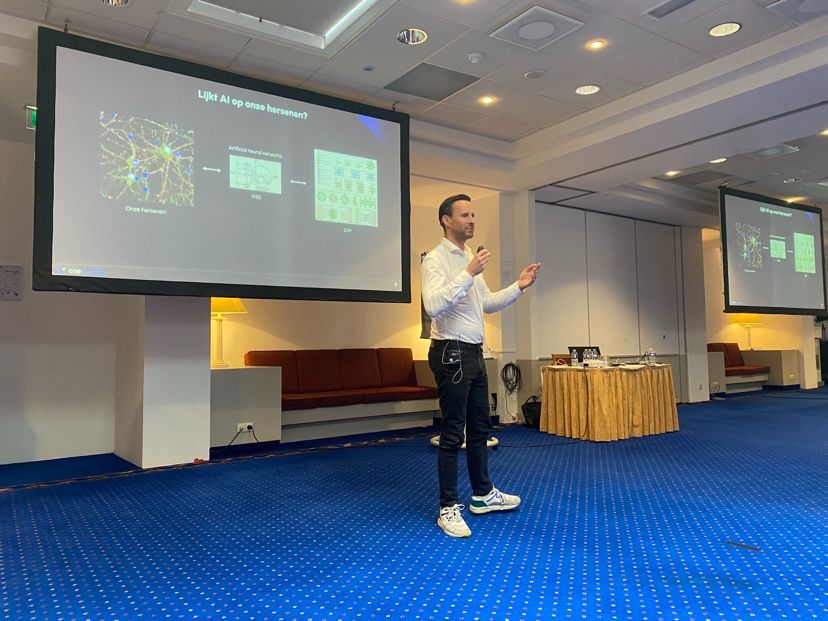Oct 11, 2024
Advisor or Algorithm? The Opportunities and Challenges of AI in the Consulting Practice
Our CTO and Co-founder Dennie van den Biggelaar delivered an insightful keynote about AI in insurance to 120 members of the Stichting Assurantie Registratie (SAR). There was a significant turnout of advisors under the accreditation schemes of RMiA, RGA, and RPA.
Artificial Intelligence (AI) is all around us. While AI is hailed for its potential to replace human intelligence, it poses the question: will humans become redundant in a world increasingly dominated by machines? This tension is particularly relevant in the insurance sector, where personal relationships and trust have been at the core of advisory practices for decades. What does the rise of AI mean for insurance advisors, who until recently seemed indispensable? Dennie van den Biggelaar, co-founder and CTO of Onesurance.ai, explores how AI is transforming the advisory practice and highlights both the benefits and the challenges.
This article was originally published in the Beursbengel. See here also for the LinkedIn post we made about it.
“Insurers, authorized agents, and intermediaries benefit from future-proof business operations. The use of data and AI is crucial in this,” states Van den Biggelaar. During the highly attended SAR theme day on AI on May 15, 2024, he shared his insights and experiences on integrating AI into advisory services. He will continue to share his knowledge in 2025 during PE sessions on AI for RMiA's and RGA's. Together with insurance veteran Jack Vos, Van den Biggelaar founded Onesurance.ai in 2022, a high-tech data science company that specifically uses AI for insurance companies to increase effectiveness and efficiency. Dennie himself has over fifteen years of experience in the field of data science, which we now commonly refer to as AI. Onesurance's efforts have not gone unnoticed: more than fifteen major authorized agents as well as insurers in the Netherlands and Belgium are using their services. Recently, they secured a significant investment from venture capitalist CuriosityVC, a professional fund that exclusively invests in AI companies.
Looking Back
The development of AI has a long history. Van den Biggelaar explains: “Back in 1950, the foundation for AI was laid. Academics and researchers like Alan Turing introduced the important question: can machines think? This led to the development of the Turing test, a benchmark to determine if a machine can mimic human intelligence.” He also mentions IBM's DeepBlue computer's victory over Garry Kasparov, world chess champion, in 1997. “A historic moment: it was the first time a machine defeated a human in a complex thinking game like chess. Fourteen years later, IBM Watson won the well-known TV show Jeopardy! against human participants. Again, evidence that AI is capable of performing complex tasks, such as interpreting language and analyzing large amounts of information in real-time.” More recently, the rise of powerful AI systems, such as the well-known ChatGPT in late 2022, has further expanded AI's capabilities. “These systems use advanced techniques like deep learning, can mimic human conversations, and generate content. This offers new opportunities for insurers to enhance customer interactions and automate processes.”
Active Customer Management
AI offers many advantages that can elevate the insurance sector, especially when it comes to improving customer management, efficiency, and decision-making. “AI enables insurance companies to manage customer relationships much more effectively,” says Van den Biggelaar. “For instance, by using predictive analytics and machine learning, insurers can predict the customer value over the entire lifecycle and identify which customers have a high risk of churn. Predictions that help advisors intervene proactively. For example, with personalized offers for customers with a high churn risk, significantly improving customer retention. This is certainly not futuristic; with the Onesurance AI Decision Engine, we have been successfully supporting active customer management at various authorized agents since early 2023.” This leads to higher efficiency, allowing the same number of employees to manage a larger customer base. This is especially relevant in a time where the number of customers increases due to consolidations, but capacity cannot always grow proportionally.
AI can also aid in better decision-making by processing and analyzing vast amounts of data. “AI models can, for instance, be used to accept complex policies. A prime example is Dazure, for which we built an AI acceptance model that accepts life insurance policies with an accuracy of 99.9 percent. The insured knows immediately if the acceptance is complete, the insurer can manage with fewer underwriters, and it saves the unnecessary use of medical professionals. They have other priorities.” “Insurance companies don't have to overhaul their entire system to reap the benefits of AI,” says Van den Biggelaar. “This makes the implementation of AI relatively straightforward and ensures that the benefits quickly become apparent in daily operations. The AI Decision Engine, for example, offers a fully integrated solution, utilizing both internal data and external sources to make better business decisions.”
Ethical Standards
While AI offers many benefits to the insurance industry, there are also concerns and challenges that we must consider. “One of the main concerns is ensuring ethical standards,” states Van den Biggelaar. “AI systems can make decisions that greatly affect customers, such as denying insurance or determining premiums. The risk here is that decisions are made based on biases or opaque algorithms, which can lead to unfair treatment. It is essential that AI systems are transparent and explainable so that customers and stakeholders can trust the decisions made by AI. This is why custom-built systems are often preferred over GenAI systems like ChatGPT.”
He also warns against losing the human element in customer interactions. “The use of AI should always be balanced with human interaction. Insurance is ultimately a people business. Trust and personal relationships are central. If you go too far with automation, it can lead to lower customer satisfaction and loyalty. AI should be used to support advisors, not to replace them entirely.”
The Barrier to Adoption
Another challenge regarding AI is the technical complexity. According to Van den Biggelaar, this can be a barrier for insurance advisors and customers. “AI models are often difficult to understand and explain. This can lead to a lack of trust in the technology, especially if customers or employees do not fully understand the workings and outcomes. It is therefore crucial to implement AI applications in an understandable and accessible way, with sufficient attention to training and explanation,” he emphasizes. At Onesurance, a lot of attention is paid to education and communication about the operation of the AI solutions they offer. Additionally, there is a risk that companies will rely too much on AI without sufficient human oversight. “This can be problematic, especially in complex or exceptional situations, where human intuition and experience are indispensable. Therefore, it is important that AI systems are always under the supervision of human experts, so they can intervene when necessary. We call this the 'human in the loop.'” It is important to know that AI systems are not static. “You need to constantly monitor and adjust them so that they continue to perform as intended. This requires significant resources and expertise, which can be a challenge. Without adequate monitoring, AI can produce undesirable outcomes over time, such as developing biases in decision-making or failing to adapt to changing circumstances.”
The Advisor of the Future
AI has evolved from a theoretical concept to a practical technology that is already widely used in the insurance sector. The evolution of AI shows how this technology is increasingly integrated into our daily lives and business processes, while simultaneously creating new challenges and opportunities. “AI, with the right approach, can indeed be an opportunity for both the advisor and the client,” says Van den Biggelaar. He concludes with a call to the insurance industry: “It is time to embrace and exploit the opportunities of AI. Let us build a future together where humans and technology work hand in hand for the best outcome. Only then can we fulfill AI’s promise and elevate the insurance industry to a higher level.”




